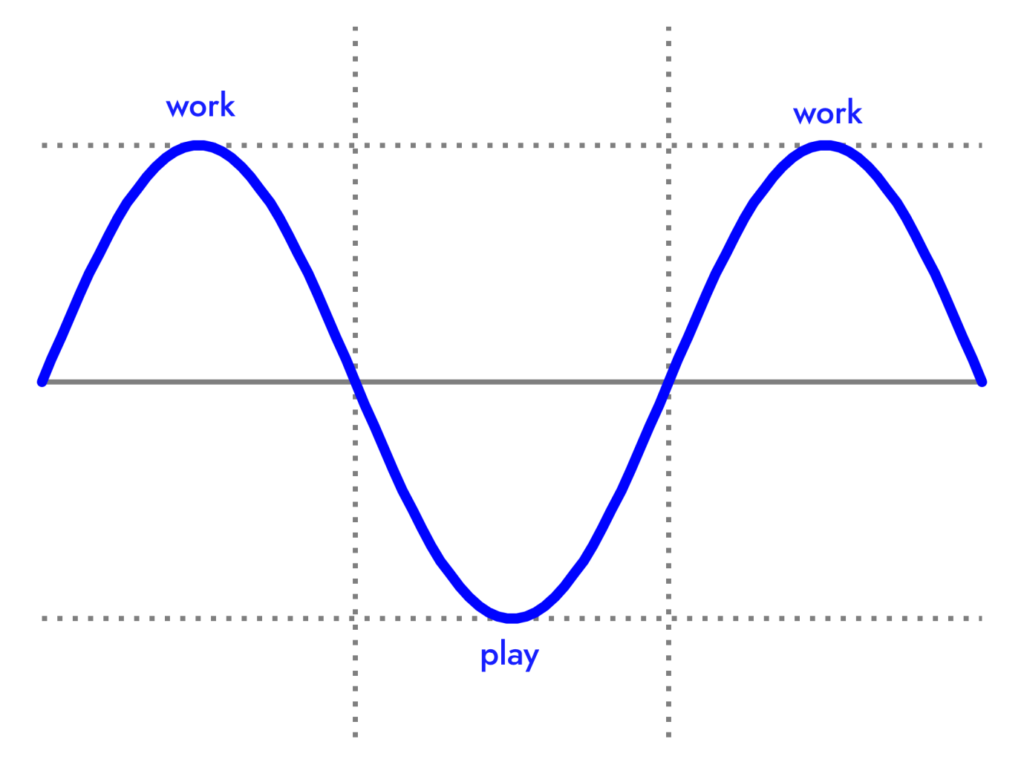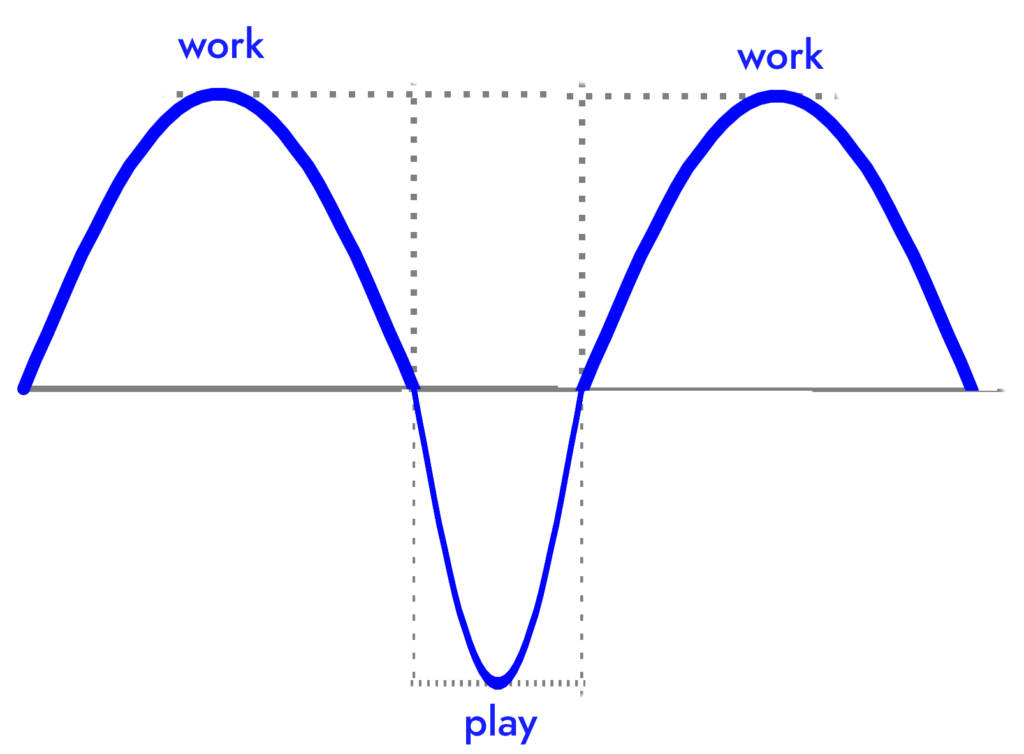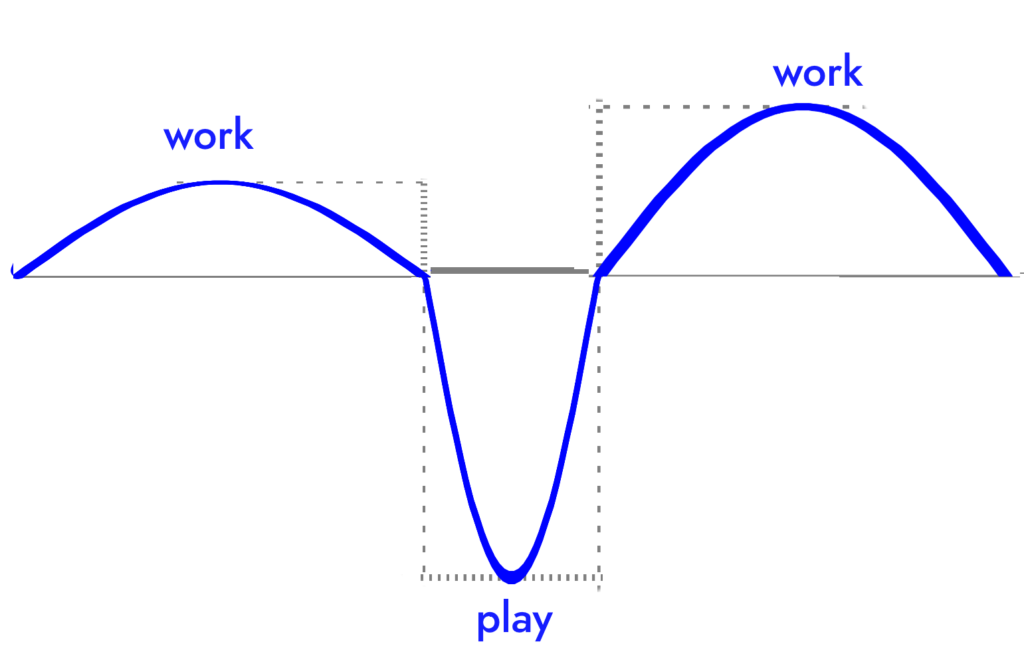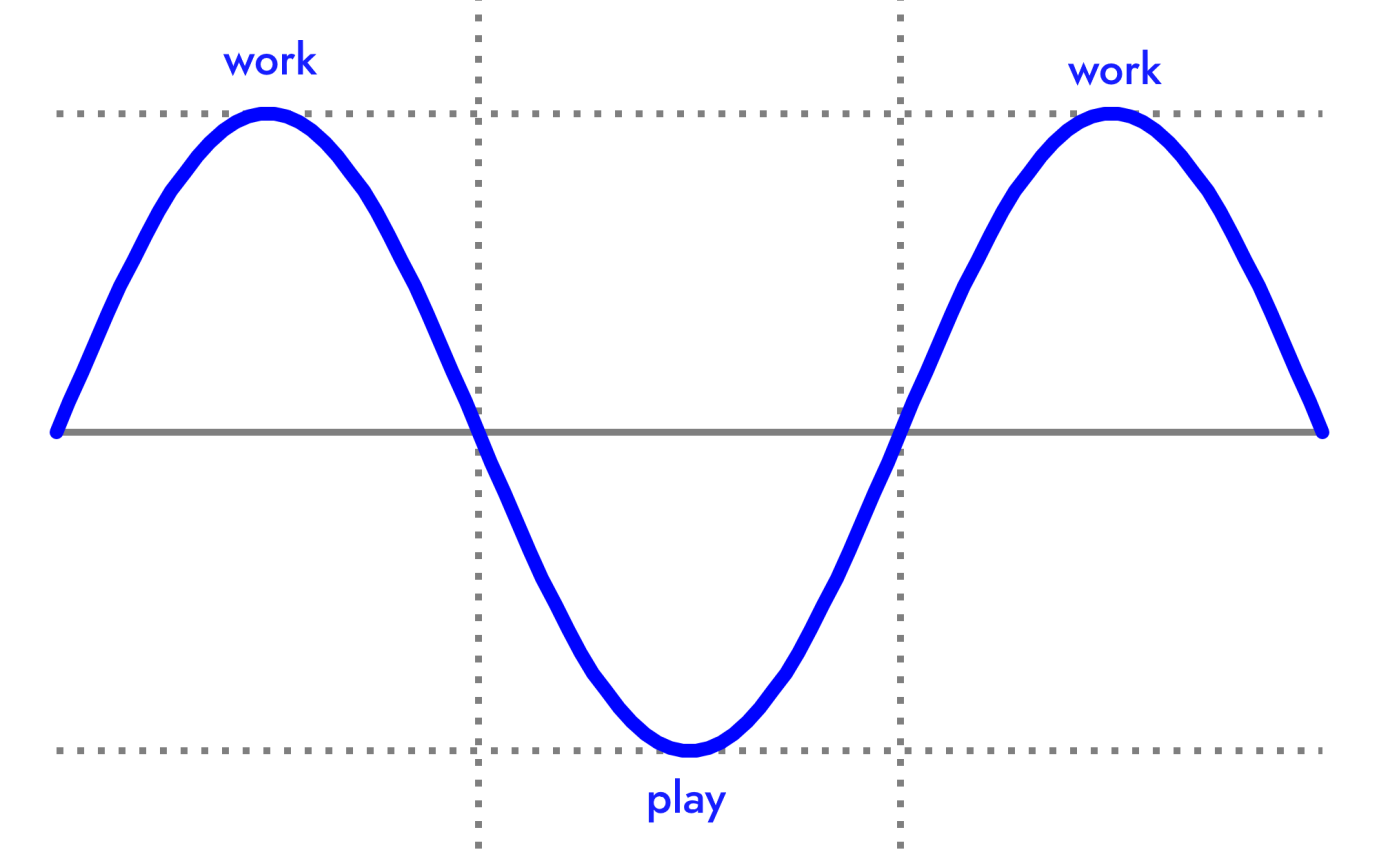Last week, we explored the balance between work and play, and dug into some of the feelings and motivations that lead to an unhealthy balance.
But what’s the end goal? What would a balanced life look like? And how we might rebalance it when it becomes skewed?
Forget about identity
To even begin answering this question, we have to let go of seeing ourselves as “a workaholic,” “a playaholic,” or similar.
Sometimes we identify with our behaviors, as if they are us. Without getting lost in philosophy, I’d like to draw a clear separation between ourselves and what we do.
If I identify as a workaholic, or playaholic—or simply as someone who “works/plays too much”—then I deny myself the possibility of change. As I mentioned last week, for many of us this struggle isn’t a serious addiction or mental health condition, but a skewed balance we can usually correct on our own.
Personally, I go through many distinct phases of imbalance. Perhaps I get caught up in a project and work all hours of the day, every day. Or maybe I’m lacking inspiration and I struggle to do the bare minimum. Or my mind might be constantly drawn to an exciting new passion.
This changes over time. If I identified as a workaholic for a few months, what would it mean if I then called myself a playaholic for months afterwards? It’s more accurate to zoom out and say “right now I am struggling to work/play at the amount I would like.”
Frequency and amplitude
As a physicist, I have been taught to pretend that literally everything can be broken down into a combination of waves, so I’m primed to see them everywhere.
So let me imagine this aspect of life as a wave:

There are times when the balance is in favor of work, and times when the balance is in favor of play.
But this graph has no scales. It’s impossible to say whether this represents a “good” or “bad” balance. (And remember: we decide what represents a good or bad balance for ourselves.)
Imagine if the frequency—the timescale—varied over “decades.” I spend one decade working, one decade playing, and so on. That would be a perfectly valid way to live a life (if it were possible to pull it off), but for most, it doesn’t seem desirable.
Then imagine if the amplitude—the size of the wave—varied from “complete and total dedication to work” to “complete dedication to play.” At these extremes I would do nothing but work or nothing but play—not even eating or sleeping. Clearly that would be terrible.
I don’t believe a balanced life would be a straight line. We don’t want to eliminate this sine wave. We’re human. We’re never going to have ideal balance between work and play at all times.
Instead, a balanced life is about managing the scales of this sine wave. Rather than spending months in favor of work, followed by months in favor of play, imagine getting the oscillation down to days, or hours.
In theory, this is what weekends are for: 5 days of work, 2 days of leisure. In practice, the two often bleed into one another.
Perhaps this work week would look like this:

But, as humans, we operate more on the scale of hours than of weeks. What would an ideal day look like? Would I be perfectly committed to work for eight hours? Or twelve? Or two? Can I guarantee I can completely switch off in my leisure time?
Variable commitment
As well as adjusting the amount of time spent, I can adjust my levels of commitment. What if barely committed to work, but spent most of my time on it? My graph might look like this:

This is a lot of words and pictures to remind ourselves of a simple concept: the amount of time and level of commitment we give to work/play are variable.
Sometimes this is due to personality. Often, it’s about circumstances—we rarely are in complete control of how much time we spend on work.
But it’s not about identity. Even if you’ve felt like a workaholic or playaholic all your life, you can consciously exercise more control over this balance in future.
Try this
Think over the last week, and plot your own sine wave of your work-play balance. How long did you spend working versus playing? How far did you go in each direction? Does your wave look skewed or balanced? How do you feel about it?
Now try the same exercise for the last year… or even decade, if you’re feeling ambitious.
I’m not going to claim that there is a perfect shape to this wave that we all should aspire to. There isn’t. But what would a perfect balance look like for you? How much time would you spend on work, how much time on play? Would it alternate daily, monthly, weekly or hourly? How absorbed would you be in your work, and by your leisure?
Obviously, our actual lives are never quite as good as our dreams. That’s fine! We can still make changes that will bring us closer.
So the final question is this: are there any practical changes which could make your actual balance look like your ideal balance? What’s stopping you from making them?!
Your Turn
What has your work-play balance looked like in the past? How would you like it to look in the future? Share with the community in the comments.

What if your work feels like play much of the time? Then when your partner wants you to set limits on your work, it can feel like they are biting into your “play” time. I wonder if anyone else struggles with this.
That’s a really interesting problem, Cristy – I guess it’s a good problem to have if you enjoy your work so much? I suppose for most people work is the less enjoyable mode to be in, but even if it’s the other way around you still need to find a balance that works for you, while taking into account your partner’s needs for your attention too. Am curious to hear what you end up thinking about this 🙂
As I read this article I got more and more uncomfortable. It seemed like it should be very useful, but I just felt frustrated. Then I realized that I don’t “play.” Ever! Surely that very dysfunctional, but wait, no, maybe not. I suddenly realized (duh, I’m slow sometimes) that my work is also my play. I’ve deliberately, although not necessarily consciously, orchestrated my life to this end. There are few things I enjoy doing that I’m not doing as work. Wow! Lucky me. I still do struggle though, mostly with prioritization and making enough money. That’s no surprise, I guess. It comes with the territory, right?
It took many years to get where I am now, so I can say that this is a great article, with concrete suggestions and I really appreciated the scientific and graphical approach.
That’s really interesting, Karen, I’ve enjoyed hearing from people with perspectives like yours lately. There’s no universal solution so if work meets all of your needs in this area then you’re already well ahead of most 🙂
I don’t know what to say, Neil. This looks an awful lot like last week’s post, only with some physics blended in. I suspect it’s something you’re currently really into?
As for your question: when I’m working full time, it’s like there is no play time at all, ’cause I need the weekend simply to recharge. So what I’m doing about it, is that whenever I get a job offer, I ask right away if we can make it 80% (as in working four days a week) instead. That does provide me with a better balance, and actual time to play.
Looking over a longer period, there is no doubt that whenever I was working, the balance was terribly off (in favour of work). During my studies however, it was just perfect. Makes one want to go back to uni, doesn’t it… ;-)))
Well, that’s good news, as this was intentionally a follow-up to last week’s post, so at least it’s recognisably part of the same series 😀 The hope was that this post would encourage a wider perspective and engagement with what we actually ultimately desire for ourselves.
And it’s interesting it has prompted you to recognise a time when the balance WAS perfect for you. I hope you don’t think that perfect balance has to remain entirely in your past!
LOL You mean going back to uni? 😀 I’d love to – there are so many fields just begging me to study them!!
Then again, I rarely worked next to my studies. Living at home as I did, there was no financial need for it. So I really had the freedom to divide my time between study and play. Ideal.
However, if I’d want to go down that path again these days, I’d need a preferably part-time job next to it in order to pay the bills. So I doubt it’ll ever be as carefree as it was in my twenties… 🙁